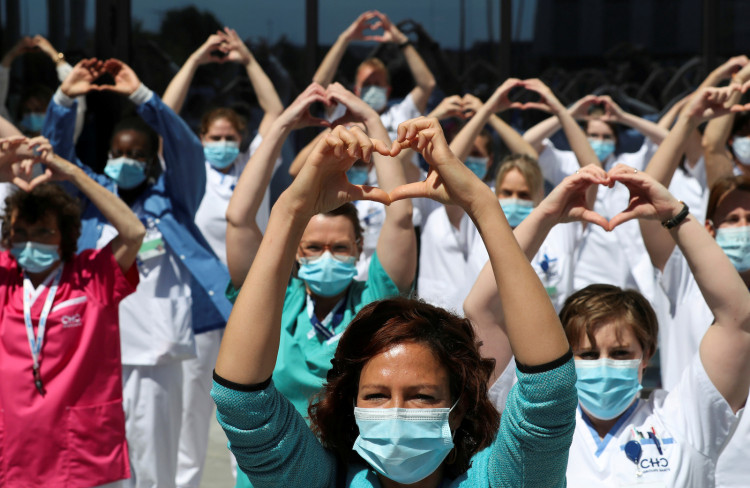Nurses have been sharing stories of pandemic survival - but the latest data suggest there is a more dangerous story behind the masks and protective suits.
Nurses' Exposure To Virus Higher Than Doctors
Data from the South Korean Ministry of Health and Welfare recently submitted to the Rep. Choi Youn-suk of the People's Party said nurses were at greater risk of contracting COVID-19 than doctors.
The study revealed that of the 159 health care providers infected with the novel coronavirus, 101 were nurses. Thirty-three who contracted the disease were nursing assistants while 14 were physical therapists or radiologists.
Of the infected nurses, 44 cases were linked to cluster infections stemming from hospitals. Thirty-nine contracted the disease through direct contact with patients and 16 were infected while treating coronavirus patients in wards.
Eleven doctors have contracted COVID-19 since January. The data said nurses were at higher risk because they are more exposed to patients.
The Korean Nurses' Association has since called for better management from the government to help reduce stress from work-related factors among health care workers.
Neglect For The World Nurses' Community?
As the number of infected nurses climbs, there have also been calls for increased protection not just for doctors but also for other health care workers in care homes - specifically for nurses.
Some nurses in hospice facilities, hospitals and aged care homes have not been given appropriate personal protective equipment, which puts them at greater risk of getting infected.
In an op-ed for The Conversation U.K. in September, Bournemouth University public health professor Ann Hemingway says: "Nurses are on the front line of this crisis, nurses are too often being left out of responses to the pandemic."
The World Health Organization declared 2020 as the Year of the Nurse and Midwife to honor the work they do.
Global 'Collective Failure' In Protecting Nurses?
Have nurses been neglected during the pandemic? The International Council of Nurses said more than 1,000 nurses had died of COVID-19.
The report said 10% of all confirmed coronavirus infections around the world were, at an average, among nurses and other health care providers.
Of 33 national nursing associations that the ICN surveyed, 16 only responded to the statement that the novel coronavirus was an occupational disease for health care workers.
South Africa Nurses Battling COVID-19 And Lack Of Support
In Africa's hardest-hit country, South Africa, nurses battle not just with the novel coronavirus but with inadequate support from the government - grueling 12-hour shifts and poor working conditions.
It is even harder for nurses in rural areas as health systems are much weaker and there is a significant short-staffing.
Nurses in South Africa have been forced to adapt to poor working conditions while working to treat COVID-19 infections. "We're doing the best we can with the little we have," nurse Ruth Seikaneng said.
There have been days when nurses had no choice but to reuse masks and some had to work longer when colleagues were sickened.
Nurses whose relatives and colleagues have died from COVID-19 have little or no time to grieve. They still need to get back to work after the short quarantine period.
The World Health Organization said around 90% of the international shortfall in nurses was concentrated on low- and middle-income nations, including South Africa.





